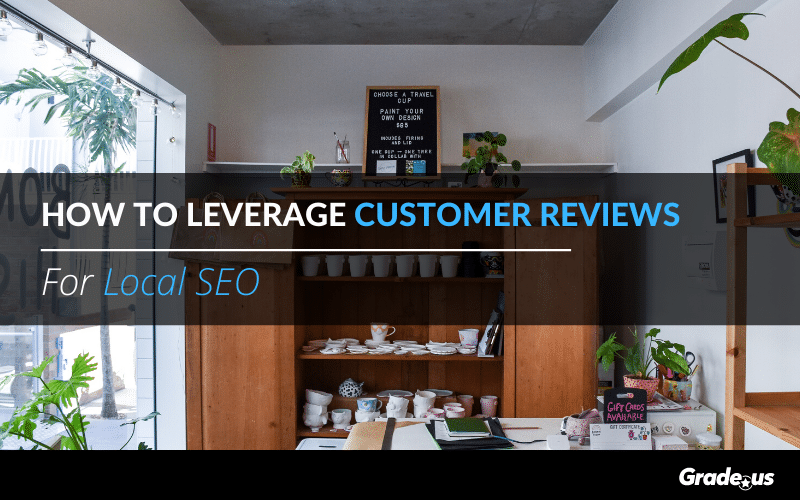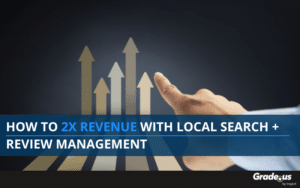If you’re a business owner, you will undoubtedly understand the importance of customer reviews. Reviews tell other prospective customers what they can expect from your business – good or bad. It’s no exaggeration to say that reviews can make or break a business.
But did you know that reviews can also be an important piece of your search engine optimization (SEO) toolkit?
Read on to learn how.
Table of Contents
What is local SEO?
SEO refers to the steps you take to help your website show up higher in the results page on Google and other search engines. Traditional SEO strategies aim to rank above all other sites on the web for the chosen keywords. On the other hand, local SEO focuses on a specific area or geographical location – a town, city, region, or state.
In other words, when you do local SEO, you aim to make your website appear high in the search rankings by people who are searching for businesses in a particular location. After all, if you run a coffee shop in New York City, it’s no use appearing in search results for people looking for a latte in Los Angeles!
Why is local SEO important?
Small businesses often have a connection to their specific geographical location. This is particularly true for those that operate from a brick-and-mortar store or office. Multi-site companies can also leverage local SEO for each of their different locations.
Have you ever searched for something like “pizza restaurant near me” or “best gym in [town name]”? The results from searches like these will have been influenced by local SEO.
Unless your business offering is truly unique, there are likely thousands of other businesses doing something very similar to what you do. Imagine you own a small digital marketing business. Realistically, you have almost no chance of ranking on the first page of Google for a keyword like “digital marketing agency.” The competition is simply too high. But if you instead focus on ranking for something like “digital marketing agency west London,” you’ve got a much better shot at success!
The stats speak for themselves. Businesswire found that 67% of Americans prefer to spend their money with local businesses. According to one speaker at the 2018 conference at Google HQ, 46% of searches have local intent. And a 2016 study by Google revealed that 76% of people making a local search visit a business within 24 hours, with 28% of these visits resulting in a purchase. That’s an awful lot of potential traffic you’re missing out on if you don’t focus on your local SEO strategy!
What is the Google “snack pack” and why does it matter?
The “snack pack,” sometimes also known as the local pack or 3-pack, is the block of three business listings at the top of the Google results page when you do a local search. Here’s an example:
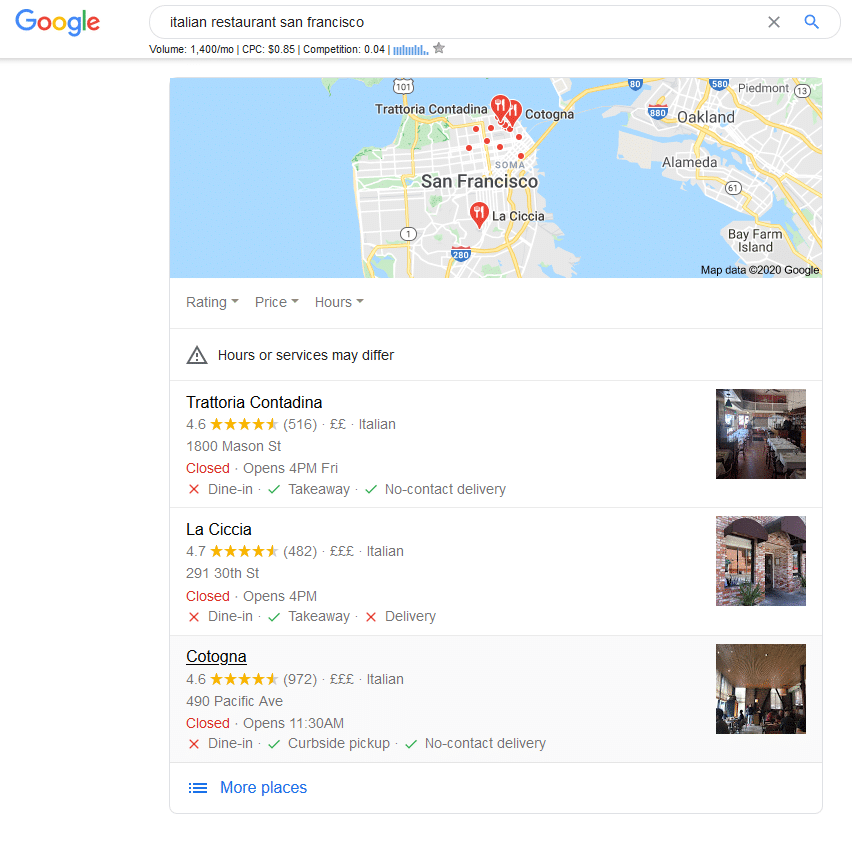
Getting into the snack pack is difficult, so it shouldn’t be your goal in your first month – or perhaps even your first year – of doing local SEO. It’s hard work and takes time, so don’t be disheartened if it doesn’t happen overnight. However, if you’re running a local business, it’s a good goal to aim for.
How to use customer reviews for local SEO
As we’ve discussed, reviews are extraordinarily powerful. 91% of consumers regularly or occasionally read online reviews, while 84% trust online reviews as much as a personal recommendation.
In the next section, I’ll explain some of the best ways to leverage your customer reviews to improve your local SEO ranking.
Set up your Google My Business page
Google My Business is Google’s business directory, listing everything from restaurants to hairdressing salons to marketing agencies, and much more. If you haven’t set up your Google My Business page yet, you should do so as soon as possible. It’s free to register and easy to set up.
Setting up your Google My Business page with as much information as possible allows Google to display your business details in several ways. If someone does a branded search for your business (i.e., searches for it by name,) a box containing information will appear on the right-hand side of the results page. This is called the Knowledge Graph. Here’s an example:
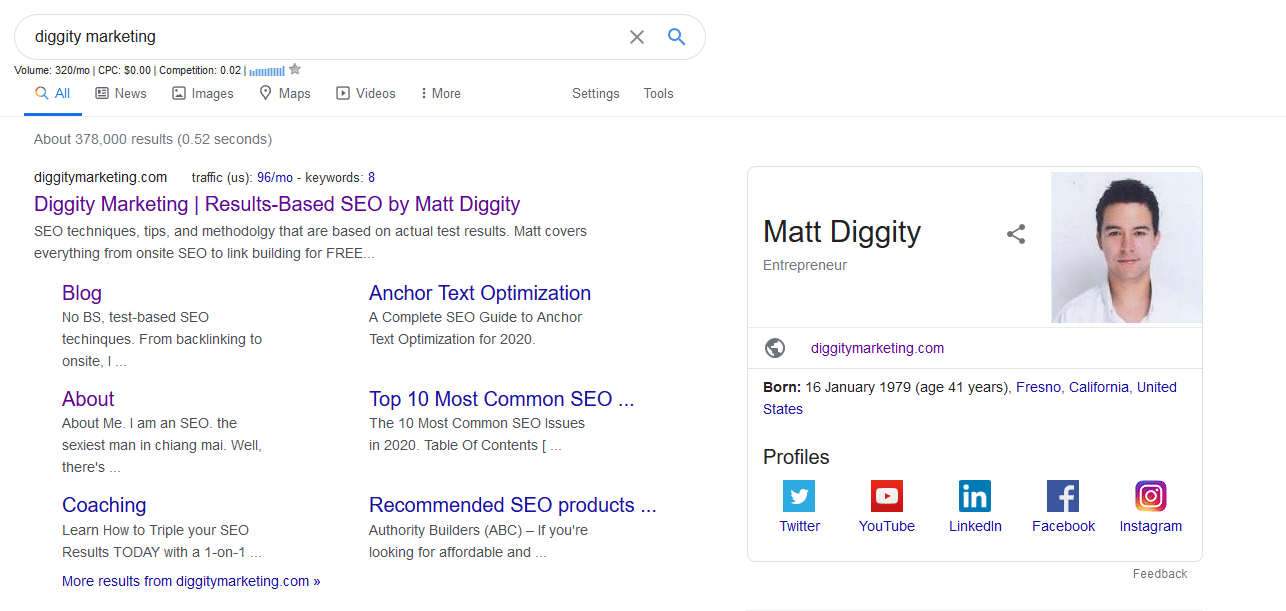
The data that makes up the “snack pack” we discussed a moment ago comes from Google My Business Listings. It is also what populates Google Maps, allowing people to get directions to your store or office.
Most importantly, in this context, claiming your Google My Business profile is what allows customers to leave Google reviews. Your review stars, any customer photos, and snippets of recent reviews will be included in your Knowledge Graph box. They will also appear in the snack pack if you’re lucky enough to bag one of those coveted spots.
Google reviews affect your ranking
Business owners often wonder if their Google review rating (an average score out of 5 stars, based on an average across all reviews) impacts their search results ranking. The short answer is a resounding yes. The most recent data on Google’s algorithm suggests that off-site local data, including reviews, is responsible for 10-13% of a site’s overall rank:
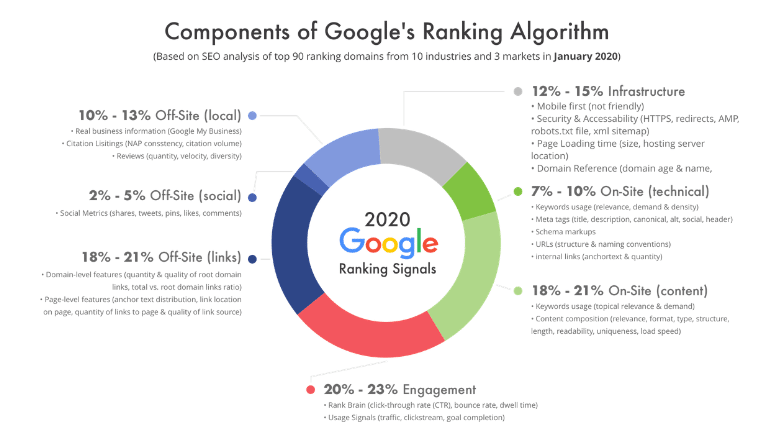
Google aims to show the best content to its users when they perform a search. When it comes to businesses, this means those with plenty of recent, positive reviews. The number of reviews you have, the diversity of those reviews, and how frequently people review your business are all factors that Google’s ranking algorithm directly takes into account.
How many reviews do I need?
The good news is that you probably need fewer reviews than you imagine to start dramatically improving your local search ranking. Marketer and author Brodie Tyler analyzed more than 20,000 local listings on Google and discovered that a business appearing in the top 3 local search results has an average of 7.62 reviews. Those appearing in positions 4-6, however, averaged just 1.61 reviews.
Companies ranking in positions 7-10 had an average of 38 reviews. As you can see, the difference between making the cut and not is small. It only takes a few additional great reviews to start beating out your competition for those top spots.
Does responding to reviews have an impact?
Google confirmed in 2018 that responding to reviews does impact local search results rankings. This is because your response sends a signal to Google that your business is actively engaging, which increases its algorithm’s estimation of your trustworthiness.
Respond to positive reviews by thanking the customer for their business and for taking the time to write a review. Respond to negative reviews by giving a genuine apology that the customer had a bad experience and, if possible, offering to fix the problem.
And if that fails, you can always take inspiration from this pizzeria in Reykjavik:

Source: Reddit
Responding to reviews builds trust with both Google and your audience directly. It’s well worth taking the time to do.
Apply structured data
Structured data is sometimes called schema markup. It’s quite complicated but well worth taking the time to learn about. In a nutshell, it’s a type of code that helps search engines to return more useful and informative information for users. Schema markup is embedded into your site via HTML code and gives search engines more information about your content.
If you don’t have a coding background, it’s easiest to do it through either a plugin (such as WP SEO Structured Data Schema or Schema App Structured Data) or Google’s Structured Data Markup Helper:
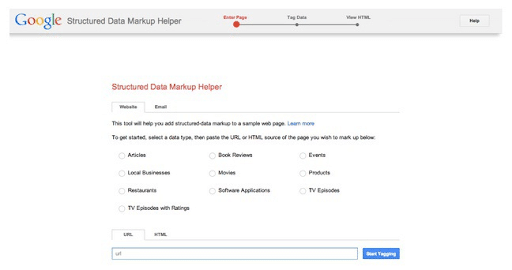
The specific markup you’ll need is the Local Business Schema Markup. Adding it helps you stand out in search results, generate more conversions, and present critical information – including reviews – in an attractive and digestible format. Here’s a fantastic and detailed guide to adding Local Business Schema Markup to your site.
Pay particular attention to the AggretateRating and Review schema properties if you’re trying to leverage customer reviews to improve your search engine ranking. AggregateRating displays an average score based on multiple ratings or reviews, while Review allows you to show a snippet of a specific customer review.
Leverage user-generated content on review sites
Sites such as TripAdvisor, Yelp, and Trustpilot allow customers to review the businesses they’ve visited. Although your review volume and overall score on third-party websites don’t directly impact search rankings, reviews on these sites still have an SEO benefit.
This is for one straightforward reason: reviews count as content. Specifically, they’re what is known as user-generated content (UGC.)
Search engines love user-generated content because they provide fresh, new content and often use relevant keywords. For example, let’s imagine you own a bakery, and you’re trying to rank for the keyword combination “vegan cupcakes in Toronto.” A customer loves your product and writes a review saying, “this bakery sells the best vegan cupcakes in Toronto!” Hey, presto – that’s an organic use of your keyword. Importantly, within the context of a review, people are looking for those five-star results. It’s what makes them click on a result.
Looking through your reviews and seeing which words and phrases crop up repeatedly is also a useful tool for your keyword research. If similar keywords are coming up again and again, chances are people will also be using those words to search for businesses just like yours.
Take the time to ensure your business is listed on the major review sites and any niche directories for your industry, and link to them from your website and social media channels. And don’t forget to respond to reviews on these platforms, too!
Try to get reviews on local authority sites
Domain Rating or Domain Authority (DA) is a metric from 0 to 100 that measures how powerful a site is. Reviews on high authority sites (typically those with a DA of 50+) with a local focus can have tremendous benefits for your local SEO.
Does your local newspaper have a website, or are there other community content sites for your city or region? If so, check these websites’ DA using Moz. If they score well, approach the editor or site owner and ask if they would be willing to run a review of your business, product, or service. You can also ask if you can write a guest post for their site. This can help your site, or pages on your site, rank for target keywords.
If there’s a well-respected blogger or influencer based in your area, you can also approach them and ask them to try out your product and write an honest review. In both cases, make sure the review links to your website.
Google gives greater weight to sites that have backlinks from authority sites. Therefore if a local site with a high DA score links to you, it will directly improve your search ranking.
If the review uses your keywords alongside the name of your city or region (for example, “nail salon in Boston”), this also introduces another way to get your business name in front of new prospective customers via search results. You’ll need to do this carefully, and need to avoid overusing your target anchor text.
Indirect SEO benefits of customer reviews
SEO is complicated, and strategies can have indirect benefits as well as direct ones. Read on to learn about some of the ways reviews indirectly impact your search
Greater clickthrough rate
Generating a substantial collection of customer reviews not only impacts how highly Google ranks your business in search results. It also has implications for the clickthrough rate.
Remember the statistic I shared above, which says that 84% of consumers consider online reviews as trustworthy as personal recommendations? Therefore, it makes sense that people are more likely to click through to your website if your business has a host of 4- and 5-star reviews.
There is some debate in the SEO field around whether Google considers clickthrough rate as a ranking metric. What is clear is that it does have an impact, even if indirectly. To quote Larry Kim, a fellow SEO expert:
“The more your pages beat the expected organic CTR for a given position, the more likely you are to appear in prominent organic positions.”
Reduced bounce rate
A “bounce” is a single-page session. In other words, when someone visits your site and closes it having viewed only one page without clicking through to any others.
If customers consider your site trustworthy, they are more likely to stay on it for longer, view more pages, and ultimately convert. You can achieve this through a combination of Google reviews, reviews on directory sites, and on-site reviews.
Place product reviews or client testimonials in a prominent place on your website. The Grade.us review management software makes it easy to share your top reviews on your site and through social media.
Moz found that sites with a bounce rate of 78% or higher were significantly less likely to tank in the coveted top 4 positions in Google’s results page.
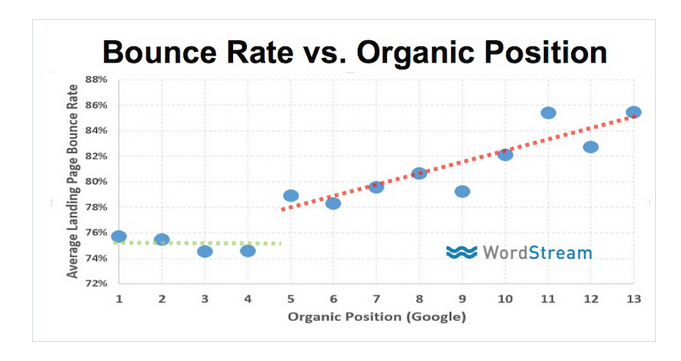
Source: Moz
A word of caution
Don’t be tempted to fake your reviews. Search engine algorithms are smart, and you’ll soon be caught out if you try to cheat the system.
Buying reviews, posting fake reviews for your own business, or encouraging your staff to do likewise, is against all the main search engines’ terms of service, including Google. Incurring a Google penalty can be disastrous for your business. A penalty can mean a substantial drop in traffic or, in the worst-case scenario, your site being delisted entirely.
In addition, you might be breaking the law. In one interesting case last year, skincare brand Sunday Riley faced legal action (though avoided a fine) for encouraging staff to post fake reviews. Attorney Charles Lee Mudd, Jr. told Search Engine Land that “[a company that falsifies reviews] will knowingly be publishing fraudulent information about its products and services. I see this violating both state and federal consumer protection and deceptive trade practices laws.”
Gaining and utilizing reviews is an ongoing strategy
One glowing review, or even ten, won’t cut it. Getting great customer reviews and leveraging them in your SEO strategy is an ongoing process that will not yield results overnight.
The best way to build up a profile of positive reviews is to be amazing at what you do. When people find a product they love or experience fantastic customer service, they naturally want to tell others about it.
Here are a few other ways you can ask for reviews:
- On the “thank you” page at the end of an online transaction.
- In your email signature.
- On your business cards.
- Via your e-newsletter.
- At the end of a phone call.
- On social media.
Make it quick and easy for customers to leave a review by linking directly to the review page. The less effort it takes, the more likely they are to do it.
As you’ve seen, customer reviews have many benefits for your business, not least their uses in boosting your local SEO. Make gaining positive customer reviews a central part of your SEO strategy, and you’ll soon see results. Perhaps you’ll even win one of those coveted snack pack spots. Good luck!

